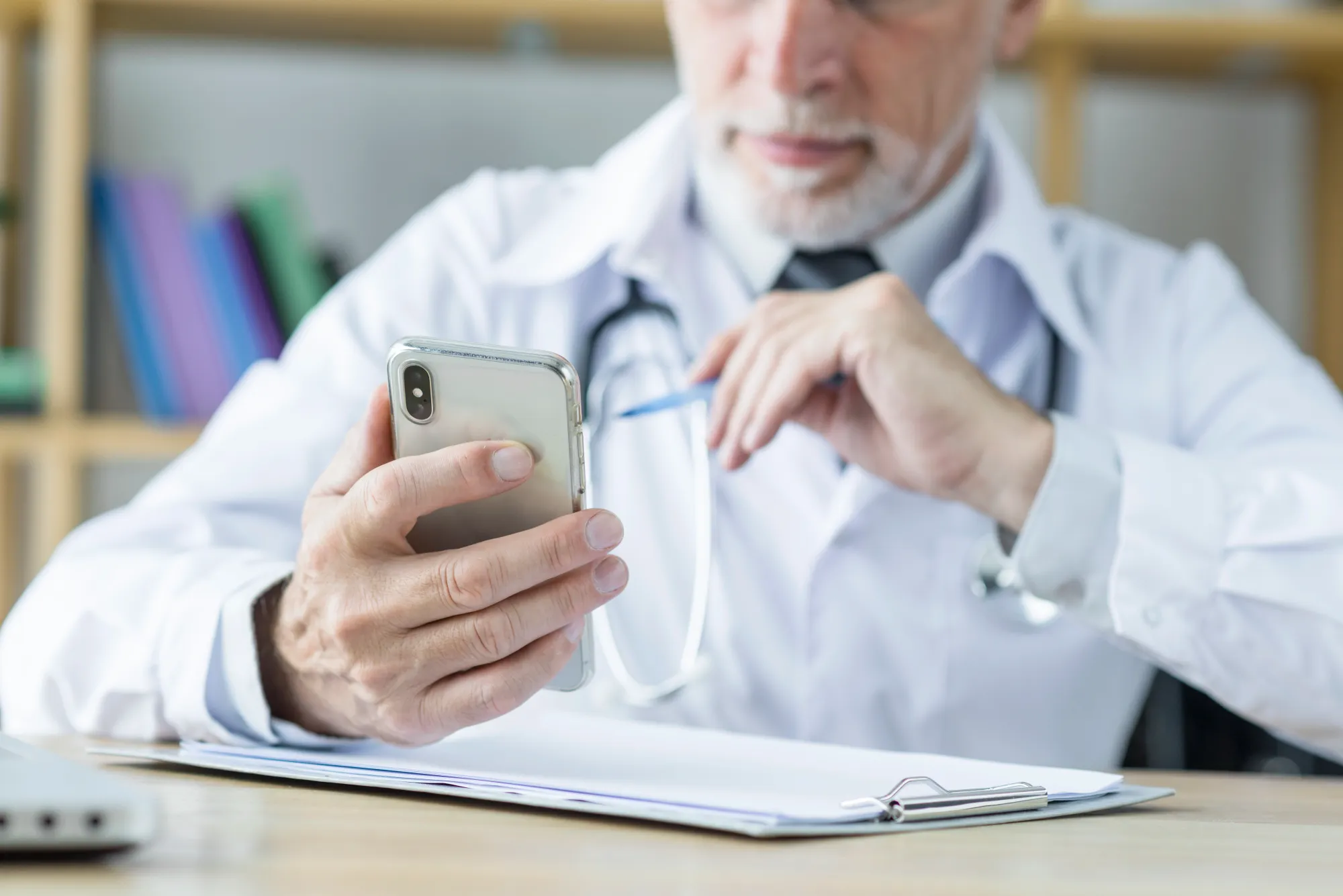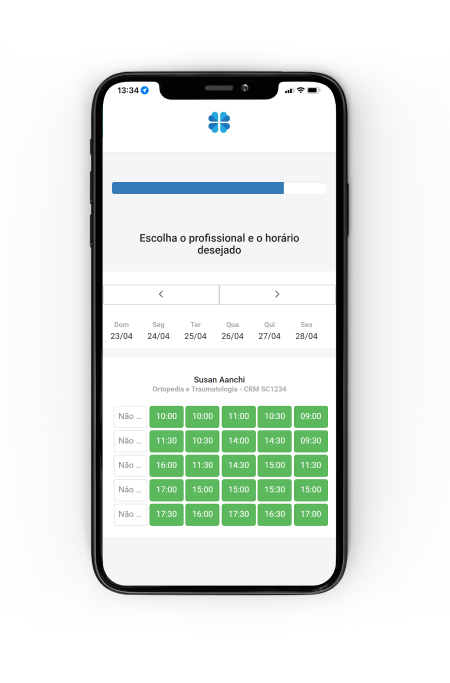
WhatsApp has become a crucial ally for clinics and hospitals in the United States seeking to improve their efficiency and meet modern communication demands. With the growing need for speed and accessibility, this instant messaging application has emerged as a versatile and valuable tool.
Before we proceed, do you already know about the Ninsaúde Clinic? Is a medical software with a flexible and comprehensive schedule, personalized electronic health records for each specialty, telemedicine, insurance billing, and much more. Schedule a demonstration or try out the Ninsaúde Clinic now!
Its ease of use and wide-reaching capabilities enable healthcare professionals, patients, and medical staff to connect quickly and conveniently. When it comes to patient care, WhatsApp offers an efficient platform for sending appointment reminders, and prescriptions, and even answering simple health-related questions.
This contributes to reducing no-shows and improving clinic scheduling and resource management. Moreover, continuous interaction with patients through the application creates a closer bond where questions and concerns can be addressed more immediately.
In summary, WhatsApp proves to be an effective and practical communication tool for clinics and hospitals, enhancing both internal communication and the patient experience. Its versatility and user-friendliness make it a smart choice for modernizing healthcare services, keeping institutions aligned with patient expectations and demands in the digital age.

Tips on Implementing WhatsApp in Your Clinic
When it comes to effectively using WhatsApp in the American healthcare environment, it's essential to adopt practices that optimize communication while ensuring patient data privacy and security. Here are some practical tips for doctors and clinics:
- Use End-to-End Encryption: WhatsApp provides end-to-end encryption, ensuring that patient information is secure. Be sure to enable this feature to protect patient data.
- Establish Internal Usage Policies: Create internal policies for WhatsApp usage in the clinic, defining clear guidelines for doctors and staff. This can cover the type of information that can be shared, communication frequency, and message storage.
- Train Your Team: Ensure that all team members are well-informed about best practices for using WhatsApp, including the importance of not sharing sensitive information in public or unencrypted groups.
- Utilize Automated Messages: Explore the possibility of using automated messages to provide basic information to patients, such as office hours and contact details. This can save time and keep patients well-informed.
- Set Contact Hours: Define specific hours for patient communication, ensuring that doctors and staff have time to focus on their appointments and clinical tasks.

Efficient Communication Between Doctors and Patients
Efficient communication between doctors and patients is essential for delivering quality healthcare and building trust-based relationships. In this context, WhatsApp has emerged as a valuable tool that allows closer and immediate contact between doctors and their patients.
Using WhatsApp to maintain closer contact with patients can include various situations. For example, doctors can send appointment reminders, allowing patients to keep their appointments punctually. Additionally, post-appointment follow-up messages can be sent to check the patient's progress, answer questions, and provide additional guidance. This creates a continuous communication channel, allowing patients to feel supported in their healthcare journey.
Examples of suitable messages for medical communication include sending test results, information about prescribed medications, and post-operative care instructions. It's also possible to share educational resources, such as articles and videos related to patients' conditions, promoting a more comprehensive understanding of their health. Additionally, the ability to respond to general health questions via WhatsApp is an effective way to provide preventive guidance and clarification.
However, it's crucial to prioritize patient privacy and security. When using WhatsApp for medical communication, doctors must ensure that messages are encrypted and compliant with local regulations, such as the Health Insurance Portability and Accountability Act (HIPAA).
In summary, WhatsApp offers a practical and effective platform for doctors and patients to establish close and quality communication, improving patient care and promoting holistic health. From appointment reminders to providing essential information, this modern tool is shaping the future of medical communication.

WhatsApp as a Pre-Appointment Screening Tool
WhatsApp has emerged as a valuable pre-appointment screening tool for clinics in the United States, providing a more efficient approach that saves time and resources. By strategically using this instant messaging application, clinics can conduct an initial screening process to identify patient needs and priorities even before they arrive at the clinic.
One way clinics can leverage WhatsApp is by creating customized forms to collect relevant information. For example, by sending a triage form link, patients can provide details about their symptoms, medical history, and specific needs. This allows the clinic staff to assess the severity of the situation in advance and direct the patient to the appropriate healthcare professional, saving time and avoiding healthcare system overload.
Additionally, WhatsApp enables real-time communication, which is particularly useful for answering general questions and providing basic information about the clinic, its services, and office hours. Patients can receive guidance on preparing for their appointment, contributing to a smoother and more organized experience on the day of their visit.
In summary, WhatsApp is a versatile tool that allows clinics to modernize their screening processes, saving time and resources while providing more efficient and personalized patient care. When used strategically, WhatsApp can be a key component in improving healthcare services and optimizing patient flow.
Appointment Scheduling and Reminders
Regarding appointment scheduling, WhatsApp offers a direct and convenient communication channel between patients and clinics in the United States. Patients can send messages to schedule appointments quickly and effortlessly, avoiding long waiting times on phone calls. Additionally, clinics can use automated responses to confirm dates and times, making the process even more efficient. This also allows clinics to organize their appointment schedules more strategically, improving resource management.
Sending appointment reminders via WhatsApp is equally beneficial, significantly reducing appointment no-shows. Automated reminders, such as friendly text messages, help patients remember their appointments, resulting in higher attendance rates and fewer gaps in the schedule. This, in turn, saves clinics time and resources while providing more efficient and punctual care.

Integration with Clinic Management Systems
The integration of WhatsApp with clinic management systems has proven to be an effective practice for optimizing healthcare institution administration in the United States. This integration allows clinics and healthcare professionals to have all the necessary information in one place, offering numerous advantages.
WhatsApp can be integrated with clinic management systems in various ways. Firstly, it enables clinics to communicate efficiently with patients and internal staff directly from the management software. This streamlines the appointment scheduling process, appointment reminders, patient inquiries, and even the sharing of crucial medical information, all within a single platform.
A notable example of clinic management software that incorporates WhatsApp is Ninsaúde Clinic. This software brings together all the necessary features for clinic administration in one place, and WhatsApp integration further enhances communication. This combination allows clinics to access patient information, medical history, and appointment scheduling while communicating effectively through WhatsApp, making the experience more practical and integrated.
The benefits of having all information in one place are numerous. In addition to streamlining communication, this approach simplifies workflow, reduces errors, and speeds up patient care. This results in a more satisfying experience for patients and staff, improving operational efficiency and ensuring that all parties involved have quick access to essential data.
In summary, the integration of WhatsApp with clinic management systems, such as that offered by Ninsaúde Clinic, represents an effective way to consolidate information and improve communication. This approach offers efficiency, convenience, and a more integrated experience for clinics and patients, setting a new standard of excellence in healthcare institution management.
Did you find these tips helpful? Keep following the blog to stay informed about more content like this. Are you a healthcare professional who hasn't yet adopted management software? Discover the Ninsaúde Clinic.
